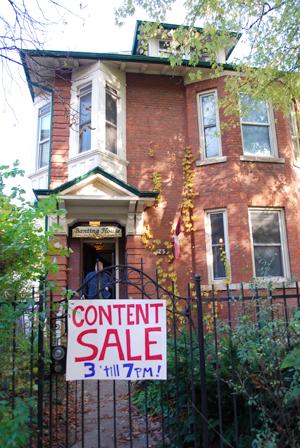A sex-work advocacy organization says residents living on or near Homewood Ave should take their complaints about sex workers to those politicians who continue to criminalize prostitution.
About 30 local residents blamed sex workers for damage to private property and late-night noise at an Oct 12 meeting with Ward 27 Councillor Kristyn Wong-Tam.
“The problem here is the law, not sex workers,” says Chanelle Gallant, a sex work activist and communications coordinator for Maggie’s, a Toronto sex workers’ organization. “Residents should take their concerns up with the lawmakers who have put sex workers in the situation where they can’t exert any control over their work.”
The city of Toronto is considering traffic restrictions on Homewood Ave to decrease the number of johns cruising for sex workers along the stroll through the night.
If the restrictions are adopted, drivers would not be allowed to turn onto Homewood Ave from Wellesley St between 11pm and 6am.
The proposal has now gone to the Toronto and East York Community Council.
But Gallant says not all area residents are in favour of the turn restriction. Homewood Ave resident Dara Douma wrote to Wong-Tam requesting her “inaction.”
“I’m writing to request that you do not help this group in their NIMBY-ish relocation program,” the letter states.
Douma says sex workers shouldn’t have to hide in dark alleys or unsafe spaces.
“For myself, their presence makes my street safer. They are a good measure of how safe a street feels. They are more vulnerable than I am, and they are at a greater potential risk of becoming victims of violence or abuse, so I feel safe walking home at night as long as they feel safe on this street,” she says.
Detective Matt Moyer, of the Toronto police, says he doesn’t think a turn restriction will do much to curb sex traffic in the area.
“I think first and foremost we have to provide safety,” he says. “But this won’t stop the sex trade. If the traffic is restricted, sex-trade workers will find a way to circumvent it and work around it.”
Moyer says unclear laws about sex work are often confusing.
“We take direction from the courts,” he says. “It’s the same as marijuana. It’s hard as police officers these days, because we don’t have a clear-cut definition of what we should do and shouldn’t do.”
Moyer doesn’t have statistics on the number of resident complaints. He says no records are available unless police are called. “We don’t get a lot of calls for service up there . . . We’re doing everything we can to accommodate the community and the sex-trade workers, but you can only do so much.”
Wong-Tam says the initial complaint came from the Homewood-Maitland Safety Association (HMSA) in the spring. The association asked that the city consider restricting the turn.
This is not the first time the issue was raised. In 2008, the HMSA launched a series of late-night demonstrations in an effort to drive sex workers from the area.
The group has once again been writing letters to police, the mayor’s office and Wong-Tam.
Business owner Paul Hyde formed the HMSA about five years ago with a handful of other residents.
“We approached [former Ward 27 councillor] Kyle Rae and the police, but it went nowhere,” he says. “Meanwhile, some of the residents were attacked. It was getting so bad that we formed a neighbourhood association. We just felt the sex trade shouldn’t be in a residential area.”
After 11 years at 73 Homewood Ave, Hyde and his partner are selling Banting House, their bed and breakfast.
“It’s difficult to mix tourism with sex trade. Our customers don’t like it. It frightens them,” he says. “We just wanted the sex workers to stop vandalizing our cars and our homes. The noise at night is terrible, the damage to property and the threat of violence . . . the turn restriction won’t end it, but it will calm it.”
Hyde says he is in favour of sex-worker rights, “but one right shouldn’t come at the expense or safety of others . . . Until sex work is legalized and monitored, and there’s regulation around where it can take place, this is the way we should go,” he says.
Gallant disagrees, noting that there is no proof sex workers are responsible for damage to property or violence in the neighbourhood.
“We think the arguments made by some of the homeowners are baseless,” she says. “We don’t think sex workers contribute whatsoever to the danger of a neighbourhood. In fact, we believe gentrifiers pose a danger to sex workers.”
Gallant reminds that sex workers are also residents of the area and will defend their right to work. She says just 10 percent of sex workers work outdoors.
“Sex workers are pretty good at defending the area where they work,” she says. “I don’t think this will keep sex workers away. Maggie’s believes sex workers are entitled to share that space.”
Gallant says the only long-term solution is decriminalization.
“Decriminalization would prevent gentrifiers from targeting and harassing sex workers, and it would make things safer for sex workers as well. Also, if sex work was decriminalized, we could be at the table and have a conversation about these issues.”

 Why you can trust Xtra
Why you can trust Xtra


